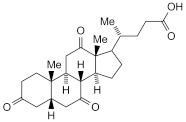Action and use
Bile acid; treatment of gallstones.
Definition
Ursodeoxycholic Acid Tablets contain Ursodeoxycholic Acid. They may be coated.
The tablets comply with the requirements stated under Tablets and with the following requirements.
Content of ursodeoxycholic acid, C24H40O4
92.5 to 107.5% of the stated amount.
Identification
A. Extract a quantity of the powdered tablets containing 0.1 g of Ursodeoxycholic Acid with 10 mL of
ethanol (
96%), centrifuge and evaporate the supernatant liquid to dryness in a stream of nitrogen in a water bath at room temperature. Dry the residue at room temperature at a pressure of 0.7 kPa for 2 hours. The
infrared absorption spectrum,
Appendix II A, of the dried residue is concordant with the
reference spectrum of ursodeoxycholic acid (
RS 402).
B. In the Assay, the chromatogram obtained with solution (1) shows a peak with the same retention time as the principal peak in the chromatogram obtained with solution (2).
Tests
Dissolution
Comply with the requirements for Monographs of the British Pharmacopoeia in the dissolution test for tablets and capsules, Appendix XII B1.
test conditions
(a) Use Apparatus 1, rotating the basket at 100 revolutions per minute.
procedure
Carry out the method for liquid chromatography, Appendix III D, using the following solutions.
(1) After 45 minutes withdraw a sample of the dissolution medium and filter. Dilute with dissolution medium, if necessary, to produce a solution containing 0.017% w/v of Ursodeoxycholic Acid.
chromatographic conditions
(a) Use a stainless steel column (10 cm × 4.6 mm) packed with
octadecylsilyl silica gel for chromatography (5 µm) (Spherisorb ODS is suitable), fitted with a stainless steel guard column packed with the same material (Lichrospher 100-RP 18E is suitable).
(b) Use isocratic elution and the mobile phase described below.
(c) Use a flow rate of 2 mL per minute.
(d) Use a column temperature of 40°C for both columns.
(e) Use a detection wavelength of 210 nm.
(f) Inject 200 µL of each solution.
mobile phase
280 volumes of acetonitrile R1 and 720 volumes of a 0.05m phosphate buffer prepared by dissolving 6.81 g of potassium dihydrogen orthophosphate in 1000 mL of water and adjusting the pH to 6.5 with 2m sodium hydroxide.
determination of content
Calculate the total content of ursodeoxycholic acid, C24H40O4, in the medium using the declared content of C24H40O4 in ursodeoxycholic acid BPCRS.
Related substances
Carry out the method for liquid chromatography, Appendix III D, using the following solutions in Solvent A.
Solvent A20 volumes of methanol and 80 volumes of the mobile phase. (1) Add a quantity of the tablets containing 250 mg of Ursodeoxycholic Acid to 15 mL of Solvent A and mix with the aid of ultrasound for 15 minutes. Dilute to 50 mL and filter (0.45-μm PVDF filter is suitable).
(2) Dilute 1 volume of solution (1) to 200 volumes.
(3) 0.5% w/v of ursodeoxycholic acid impurity standard BPCRS and 0.0055% w/v of chenodeoxycholic acid BPCRS (impurity A).
(4) Dilute 1 volume of solution (2) to 10 volumes.
chromatographic conditions
(b) Use isocratic elution and the mobile phase described below.
(c) Use a flow rate of 0.6 mL per minute.
(d) Use a column temperature of 40°.
(f) Inject 8 µL of each solution.
(g) Allow the chromatography to proceed for 5 times the retention time of ursodeoxycholic acid.
mobile phase
25 volumes of acetonitrile, 34 volumes of methanol and 47 volumes of a solution prepared by dissolving 0.8 g of sodium dihydrogen orthophosphate dihydrate in 1000 mL of water and adjusting the pH to 3.0 with orthophosphoric acid.
When the chromatograms are recorded under the prescribed conditions the retention times relative to ursodeoxycholic acid (retention time, about 5 minutes) are: 7-ketolithocholic acid (impurity F), about 1.3 and chenodeoxycholic acid, about 2.8.
system suitability
The test is not valid unless, in the chromatogram obtained with solution (3), the resolution between the peaks due to ursodeoxycholic acid and 7-ketolithocholic acid is at least 2.0.
limits
In the chromatogram obtained with solution (1):
the area of the peak due to chenodeoxycholic acid is not greater than 3 times the area of the principal peak in the chromatogram obtained with solution (2) (1.5%);
the area of any other secondary peak is not greater than the area of the principal peak in the chromatogram obtained with solution (2) (0.5%);
the sum of the areas of any secondary peak is not greater than 4.2 times the area of the principal peak in the chromatogram obtained with solution (2) (2.1%).
Disregard any peak with an area less than the area of the principal peak in the chromatogram obtained with solution (4) (0.05%).
Assay
Weigh and powder 20 tablets. Carry out the method for liquid chromatography, Appendix III D using the following solutions in Solvent B.
(1) Mix a quantity of the powdered tablets containing 0.3 g of Ursodeoxycholic Acid with 20 mL of solvent B with the aid of ultrasound for 15 minutes, shake intermittently and filter, if necessary.
chromatographic conditions
(b) Use isocratic elution and the mobile phase described below.
(c) Use a flow rate of 1.5 mL per minute.
(d) Use a column temperature of 50°.
(e) Use a detection wavelength of 210 nm.
(f) Inject 10 µL of each solution.
(g) Allow the chromatography to proceed for twice the retention time of ursodeoxycholic acid.
mobile phase
500 volumes of acetonitrile R1 and 500 volumes of a solution containing 1.2% w/v of sodium dihydrogen orthophosphate dihydrate, 0.4% w/v of disodium hydrogen orthophosphate dihydrate and 1.08% w/v of tetrabutylammonium hydrogen sulfate in water.
determination of content
Calculate the content of C24H40O4 in the tablets using the declared content of C24H40O4 in ursodeoxycholic acid BPCRS.
Impurities
The impurities limited by the requirements of this monograph include A, D, E and F listed under Ursodeoxycholic Acid and the following:
1. 3,7,12-trioxo-(5β)-cholan-24-oic acid (dehydrocholic acid).
